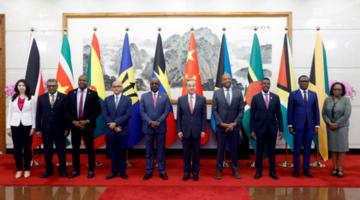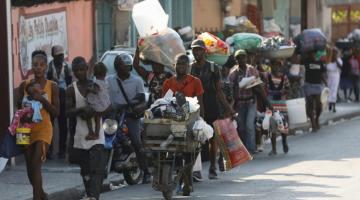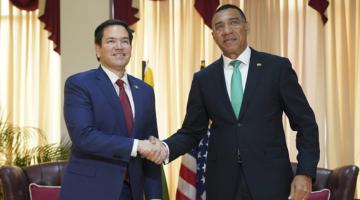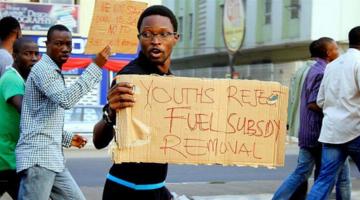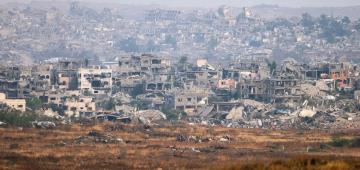Mia Mottley of the Barbados Labor Party (BLP) was sworn in as Prime Minister of the Republic of Barbados for a second consecutive term. (Photo: Prensa Latina)
Despite the praise she receives for being the “progressive” leader needed in the Caribbean, Mia Mottley and her policies in Barbados and her work within CARICOM have not veered outside the realm of neoliberal politics in any way.
Mia Mottley, the current prime minister of Barbados, has emerged as one of leaders of the Global South in the 21st century in a world riddled by intersecting and worsening ecological, economic, political and social crises. Her rise to international repute has come at a time of shifting global power dynamics with the recent expansion of the BRICS, the Chinese challenge to Euro-American hegemony, the so-called ‘progressive’ turn of politics in Western democracies popularizing green new deals, climate and workers’ movements demanding transformative change and greater shares of economic gains following the COVID-19 pandemic.
At the same time, xenophobic and far-right nationalisms are resurging across Western societies, including movements supposedly fighting against ‘white replacement’ and anti-racism. Mottley has even been touted as a possible top contender for the job of United Nations Secretary-General, whose election coincides with the end of her term as prime minister of Barbados. Coming from a small island nation that faces the most extreme consequences of climate change, it is no wonder her popularity has come after major forceful speeches at the United Nations where she has called out the inaction of global leaders on that question.
But what is radical about Mia Mottley’s climate proposals and the proposed reforms of the international financial system? Is she the leader the world needs and radical movements have been calling for at this current moment? How do these international proposals for climate justice match her record as a Caribbean politician? Her record and proposals need to be evaluated on their own merits, especially since many who have praised and welcomed her speeches pay very little to the domestic or regional politics.
In Barbados, Mottley remains popular despite the fact that her policies have shafted Black working-class Barbadians. In 2021, she led her country to become a republican state, which decided using its parliamentary majority to remove the British monarch as head of State. This decision was widely praised locally and regionally. However, a closer look at her domestic actions reveals an insidious and nefarious underbelly of a firmly committed neoliberal politician.
On the cusp of taking office in 2018, as the first female prime minister of Barbados, she announced a decision to retrench more than 1000 Barbadian public-sector workers. This number has expanded to more than 1500 to date. This retrenchment program has disproportionately affected more women than men. While under the severe constraints of an International Monetary Fund (IMF) Program that was initiated since 2013, Mottley nonetheless has praised the implementation and effects of this program, labeling it a ‘homegrown program,’ stating in 2022 that it has “worked for us” while exaggerating that the economic situation has improved by “500%.” Mottley's first two years of office showed her committed interest in deepening the enmeshment of Barbados in the global neoliberal tourism economy. Indeed, her administration still wants to aggressively build hotels on the entire stretch of the Carlisle Bay, a small natural harbor located in the southwest region of Barbados and the site of the most popular beaches that working class Barbadians use.
In January 2022, writing in the Barbados Today, political scientists Kristina Hinds and Aaron Kamugisha noted that Mottley called early elections eighteen months ahead of her mandate’s end while her government failed to put provisions in place for people in covid quarantine or covid positive people to vote. This inaction disenfranchised thousands of people in an electorate of no more than 200,000 voters. It is notable that the end of her new mandate coincides, interestingly, with the end of the second term of office of the sitting United Nations Secretary General Antonio Guterres in 2026.
The Mottley-led Barbados Labor Party government has also divested from state-owned enterprises, reformed the public pension system to make it more “efficient,” is reviewing labor laws with the aim of increasing “flexibility,” i.e. to fire people more easily, increased regressive taxation, and has even floated the idea of increasing the pensionable age from its current 60 years to 68 years anticipated in 2034. As a result, the minimum number of years one has to work before receiving a pension will increase from 10 to 15 years; and the qualifying age for reduced pensions is going from 60 to 63. The “savings” from layoffs were estimated to be about 2% of its gross domestic product (GDP). These actions are all common ingredients in the neoliberal economic recipe.
While we cannot discount the forceful role of the IMF in maintaining neoliberal economic policies, we equally cannot discount how committed based on her recent utterances, Mottley (and as a matter of fact by extension the entire Caribbean misleadership class) remains to these reforms that impose persistent austerity, and worsen inequality and hardship on working-class Barbadians. Mottley has not challenged inequality among working-class Barbadians, nor has she challenged the tiny white elite that control the majority of wealth in that country.
On the question of reparations, Mottley has also stood out as a “progressive” voice. She has stood out for her interventions on reparations for Caribbean countries which have suffered because of crimes against humanity perpetrated during trans-Atlantic slavery and native genocide. As chair of the Caribbean Community (CARICOM) sub-committee on Reparations, she has publicly represented the regional body and its Commission at the international level. Mottley’s call for a “Marshall Plan” for the Caribbean precludes any genuine, broad-based community approach to reparatory justice whereby communities and local groups across the Caribbean make crucial inputs to “repairing” and seeking justice. She has failed to see below the gaze of the nation-state and Caribbean elites to propose meaningful participation from Caribbean peoples in these efforts, maintaining a devotion to neoliberal development at the exclusion of working-class Barbadians.
Regionally, her public stance on Haiti has equally been regressive. Mottley has supported in word and action, the proposed multinational military intervention led by Kenya and supported by the United States to the tune of $100 million. Along with the CARICOM countries Antigua and Barbuda, the Bahamas and Jamaica, which have committed to sending police forces to Haiti, these efforts continue to suppress popular uprisings and demands of Haitian people for no more imperialist, military interventions. Mottley has not shown any serious opposition to these efforts.
While her international climate speeches and certain debt reform proposals have been lauded, Mottley has stayed well within a neoliberal frame in terms of her stances on reparations and climate justice. The so-called Bridgetown Initiative that was proposed in July 2022 is yet an important example of drawing within the lines of the global economic order. Supported by the advice of economic adviser, Avinash Persaud, who has been deeply trained in neoclassical economics, Mottley has proposed a number of reforms to the international financial and monetary system. The initiative proposes minor modifications to the Special Drawing Rights system of the IMF to redirect funding to climate resilience and economic shocks faced by vulnerable countries, primarily among Caribbean territories. It suggests temporary suspension of debt interest payments after major climate-related disasters, meager debt restructuring, and the inclusion of “disaster clauses” in loan agreements, longer loan maturities and credit guarantees. These proposals ignore the longstanding calls for debt relief and cancellation in the case of unjust inherited colonial debts that locate the source of these injustices in the international financial system itself. Additionally, it promotes private capital, more multilateral lending under moderately adjusted rules, and increases fiscal risk for governments wishing to invest in climate adaptation and mitigation.
These “reforms” simply kick the debt can down the road and maintain the current hierarchies in the global economy intact. The institutions responsible for inequitable, undemocratic and harmful policies all continue to exist under Mottley’s proposals. The accumulation of capital remains unchallenged and, in fact, is seen as an answer to the so-called “unfair” system. These reforms limit any profound and substantive restructuring of the international financial system that was built upon the oppression of the global working class, and specifically Black communities in the Caribbean.
Mottley has equally commended the IMF in creating a Resilience and Sustainability Trust (RST) that seeks to provide support for future pandemics and climate mitigation to marginalized countries. Its first disbursement of $189 million was extended to Barbados in July 2023. To accompany this outlay, the IMF has also offered new lending of $113 million to Barbados as part of its Extended Facility Program, demanding as a condition for the RST disbursement continued fiscal restraint and restructuring programs aligned to the IMF’s ideology and dictum.
Neoliberalism has profoundly harmed Global south countries, dramatically increased inequalities and exploitation of working class peoples, and irreversibly harmed the environment. Mottley’s actions and philosophy fits squarely within the mold of a committed neoliberal politician and has not veered from this path either at home or internationally. So one wonders what the basis is for the praise and hope for the “progressivism” that some have expressed for her newfound international reputation and leadership. There is no reason to believe that, when faced with the supranational and powerful forces at the UN, she would act radically or differently. We should be very cautious about hollow calls for more “representation” of Afro-descended peoples or women at the helm of this global body that do not substantially change anything. The workers of Barbados and the world deserve substantially better.
Keston K. Perry, Ph.D is an Assistant Professor in the Department of African American Studies at the University of California, Los Angeles






